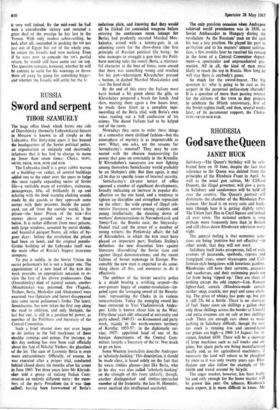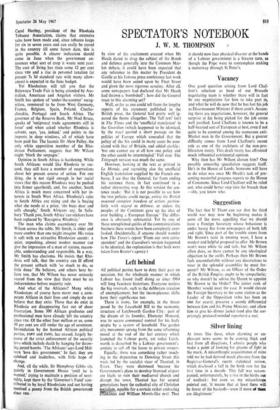God save the Queen
RHODESIA JANET HUCK
Salisbury—The Queen's birthday will be cele- brated here on 10 June, despite the fact that reference to the Queen was deleted from the principles of the Rhodesia Front in April. As well as the usual gun salutes, Mr Clifford Dupont, the illegal governor, will give a party in Salisbury and sundowners will be held all over the country. The Queen's portrait still dominates the chamber of the Rhodesian Par- liament. Her head is on every coin and bank- note (though here it is getting slightly tatty). The Union Jack flies in Cecil Square and indeed all over town. The national anthem is sung perhaps more frequently here than in Britain and still closes down Rhodesian television every night.
The general feeling is that economic sanc- tions are being 'punitive but not effective'—in other words, that they will not work.
Salisbury itself looks prosperous, full of wide avenues of jacaranda, spathoda, cypress and frangipani trees, smart skyscrapers and Cali- fornian-style bungalows with luxurious gardens. Rhodesians still have their servants, peacocks and racehorses, and their swimming pools are far from being 'ripped up.' They are short of nothing except the odd import—Lux, Ronson lighter-fuel, cereals (Rhodesia-made cereals neither snap, crackle, nor pop) and some cloth- ing. The price of whisky has gone up, but gin is still 25s 6d a bottle. There is no shortage of fuel. Super costs six shillings a gallon (but only three shillings across the border at Umtali) and extra coupons are on sale at two shillings each. There are enough cars about to make parking in Salisbury difficult, though the new car stock is running low and second-hand car prices are high—a 1960 3.4 Jaguar, for in- stance, fetched f650. There will be a shortage of large machines such as rail tracks and en- gines, but spare parts• are being manufactured lopally and, as for agricultural machinery, if necessary the land will return to be ploughed by oxen as it was only twenty years ago. Rho- desians can also follow the example of Mr Smith and travel around by bicycle.
The sugar market, however, has been badly hit and only enough for the home market a ill be grown this year. On tobacco, Rhodesia's main export, it is more difficult to know. Mr
Carol Hertley, president of the Rhodesia Tobacco Association, claims that extensive sales have been made and, since tobacco keeps for six to seven years and can easily be stored in the country till some future date, this is quite possible. A clearer indication should come in June when the government an-
nounces what sort of crop it wants next year. The cost of living has risen some .12 per cent since UDI and a rise in personal taxation (at present 7s 3d standard rate with many allow- ances) is expected in the June budget.
Yet Rhodesians will tell you that the Bulawayo Trade Fair is being attended by Aus- tralian, American and Angolan visitors. Mr Smith has spoken of 'under-the-counter' recog- nition, rumoured to be from West Germany, France, Belgium, Spain, Poland, Czecho- slovakia, Portugal and South Africa. The governor of the Reserve Bank, Mr Noel Bruce, speaks of 'reciprocal trade agreements still in force and when asked whether Rhodesia is solvent, says, 'yes, indeed,' and points to the imports in shop windows, all of which have been paid for. The laconic Dr Ahrn Palley, the only white opposition member of the Rho- desian Parliament, suggests that Mr Wilson might 'block the seepages.'
Opinion in South Africa is hardening. While South Africans would like Rhodesia to suc- ceed, they still have a number of reservations about her present course of action. For one thing, she is not rigid enough in her racial views (for this reason Rhodesia may be pushed into firmer apartheid), and, for another, South Africa is much more concerned with her in- terests in South West Africa. Rhodesia's sales to South Africa are rising and she is buying what she needs at a price; `she buys dear and sells cheaply, South Africans say. In Salis- bury 'Thank you, South Africa' car-stickers have been replaced by 'Recognise Rhodesia.'
The man who claims ascendancy over Mr Wilson across the table, Mr Smith, is older and more sombre than one might imagine. His voice is soft with an attractive Rhodesian accent: a quiet, unpushing, almost modest manner can give the impression of a man of stature, reason- able, understanding and responsible. In a way, Mr Smith has charisma. He insists that Rho-
desia will talk, that the country can ill afford
the present setback with `so much to do, so little done.' He believes, and others here be- lieve too, that Mr Wilson has never seriously veered from the view that there must be no independence before majority rule.
And what of the Africans? Many white Rhodesians of course have never met a com- petent African in their lives and simply do not believe that they exist. Those that do exist in Rhodesia are disappearing fast out of sheer
frustration. Some 300 African graduates and professional men have already left the country since UDI. Of the other four million or so, some 50 per cent are still under the age of seventeen. Intimidation by the banned African political parties, ZAPU and ZANU, has ceased, largely be- cause of the strict enforcement of the security laws which include death by hanging for throw- ing petrol bombs. 'The Africans' says Lord Mal- vern 'love this government' In fact, they are subdued and leaderless, with little hope of change.
And, all the while, Sir Humphrey Gibbs sits quietly in Government House 'until he is wanted,' trying to maintain a position of neut- rality, kept there by the 'Governor's Fund' con- tributed to by loyal Rhodesians and not having received a penny from the British government since UDI.



































 Previous page
Previous page